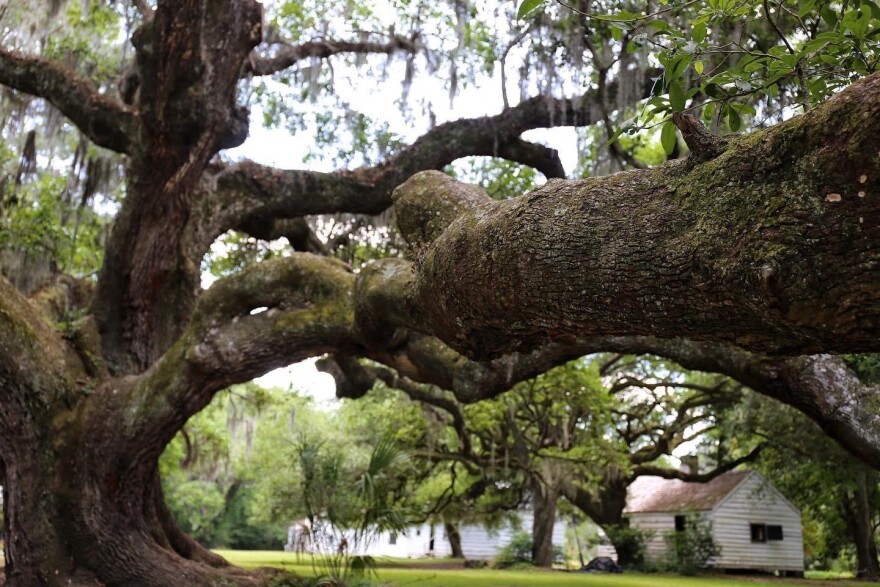Charleston, S.C.- The outstretched limbs of a centuries old, live oak sweep the ground like arms, ready to scoop up wayward tourists. It’s here, beyond the big house of Magnolia Plantation and Gardens, visitors gather to tour worn, wooden homes where enslaved Africans, forced to work the land, raised families and slept.

“These cabins were built in 1850,” tour guide and historic preservationist Joe McGill tells the group. “They were all duplexes meaning two families per building.”
McGill has slept here too, trying to save what he calls sacred spaces.
In 2010, he worked for the National Trust for Historic Preservation and was asked to inspect the Charleston cabins, then neglected and decaying. Walking through the primitive shacks took him back to an attic he visited years ago in Amsterdam where Anne Frank hid from Germans during the holocaust.
“That really did something to me,” says McGill. “It made me realize that you know, spaces are important because it was the space itself that made it more real to me.”
McGill believed preserving the personal spaces of Africans who endured slavery would make it harder to deny their existence, especially on plantations where they are frequently misrepresented or ignored. He decided then to spend the next year sleeping on the floors his ancestors laid their heads, to raise awareness. That was 13 years ago.

Today McGill is still at it and has slept in more than 200 slave dwellings in 25 states, not only on plantations, but at universities, the homes of former presidents and in northern states. Now he’s documenting his experiences in a new book, “Sleeping with the ancestors: How I followed the Footprints of Slavery”.
Friend and longtime Charleston journalist Herb Frazier co-wrote the book and initially helped promote the sleepovers that are now part of “The Slave Dwelling Project”. Frazier is fascinated by the way the project has evolved with McGill inviting people to join him for sleepovers and fireside talks.
“There were conversations with the descendants of enslaved people, they joined Joe around campfires,” says Frazier. “Then came the voices of enslavers. So, it’s a very interesting mix of people Joe has encountered.”
McGill says he discovered the power of campfire conversations as a civil war re-enactor portraying a Union soldier. He founded the 54th Massachusetts Volunteer Regiment, Company I reenactment group.
McGill doesn’t shy away from debates about race or slavery. He once worked as a park ranger for Fort Sumter, educating mostly white audiences about the first shots of the Civil War. He admits the campfire talks can get heated.
“Initially the conversation was about confederate moments should they stay or should they go,” says McGill. “You know weddings on plantations, white privilege, white supremacy, the death of George Floyd.”
Now, the conversations have turned to Critical Race theory and what it means to be "woke", subjects that have become politicized and polarizing.

McGill wants to correct the false narratives that were part of his public-school education. Then, textbooks written by the United Daughters of the Confederacy taught the Civil War was fought over states’ rights, not slavery.
“I want us not to go back to that place,” says McGill. “I think this book is a good way of making us aware that is a place we don’t want to go.”
Frazier says the new book seeks truth through history and gives voice to slaves who were silenced.
“Hopefully in these stories people will gain a better understanding of the African American experience,” says Frazier. “And gain and a deeper and more reverent appreciation for what people of African descent have done for the United States.”

Back at Magnolia Plantation and Gardens, Bethany Bittenbender of Connecticut has brought her family to visit the slave cabins. She homeschools her four children.
“I wanted them to get the real story you know,” says Bittenbender. “It’s sad and sobering”.
Bittenbender’s husband Preston is grateful the slave cabins have been saved and restored so his kids can experience the space.
“Seeing this allows them to really feel the weight of the very fact that a precious and important people were treated like this.”
McGill says he will continue to sleep where his ancestors did, on dirt floors and rickety planks, in hopes of awakening a curiosity about how enslaved Africans lived.



